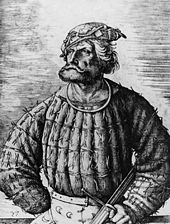Kunz von der Rosen

Kunz von der Rosen (* around 1470 in Kaufbeuren ; † 1519 ) was an advisor and court jester to the German king and later Emperor Maximilian I.
Life
Kunz von der Rosen became known through a series of dares and pranks. Among other things, he tried to free King Maximilian I, who had been imprisoned in Bruges in 1488 , by having himself brought to him disguised as a priest, where he wanted to swap clothes with Maximilian and thus help him escape. However, Maximilian declined the offer as dishonorable. It is also reported that he smashed inappropriate gifts from the Venetian ambassador and that he fell spectators into a water trough at a tournament held for the wedding of Margrave Casimir von Brandenburg .
Kunz was considered an intelligent man who knew how to stimulate thought through his jokes and his comments. He was once asked what he thought of a peace offer. Von der Rosen responded by asking how old he was estimated. After a few attempts, he said that he was over 200 years old because he had seen at least two peace offers come into force, both of which were concluded over 100 years each.
His grave is in the St. Anna Church in Augsburg .
Portrait
From an etching by his contemporary Daniel Hopfer, a portrait of Kunz von der Rosen has come down to us that was created around 1515. This portrait is known because it is erroneously referred to in numerous publications as the portrait of the pirate Klaus Störtebeker after an enterprising art dealer had rededicated it for it in 1682.
Literary adaptations
In 1844 Gustav Freytag's play Die Brautfahrt or Kunz von den Rosen appeared , a comedy about Emperor Maximilian, for which he won the Berlin Court Stage Prize.
Heinrich Heine describes in the closing words of his Englischen Fragmenten (1830), the last text of his travel pictures , Kunz von der Rosen in an anecdote in conversation with Emperor Karl V (von Heine erroneously called Emperor Maximilian I), where von der Rosen disguised in arrives at the emperor's prison cell to hand him the scepter and crown and to free him. However, the emperor refuses and asks: “Am I really emperor? Oh, it's the fool who tells me! ". This text is related to Heine's criticism of the restoration after the Congress of Vienna and the hope for the dawn of a “new era”, as he lets Kunz von der Rosen say. This is characterized by the implementation of the postulates of the French Revolution : freedom, equality, fraternity.
literature
- Gabriele Victoria Schaffner: Kunz of the roses. Confidant of Maximilians and citizens of Augsburg , in: Maximilian I. 1459 - 1519. Kaiser. Knight. Citizen of Augsburg , ed. v. Christoph Emmendörffer Heidrun Lange-Krach, Schnell & Steiner, Augsburg / Regensburg 2019, pp. 69–77
- L. Aurbacher: Kunz von der Rosen, Emperor Maximilian's funny advice. Munich 1841.
- L. Egelhofer: Kunz von der Rosen - fool or wise man? In: Kaufbeurer history sheets. Volume 12, 1990/92, pp. 445-454.
- H. Gebhart: Kunz von der Rosen, Emperor Maximilian's "funny" advice. In: The Bayerland . Volume 36, 1925, pp. 349–352.
- F. Schmitt: Kunz von der Rosen. Statesman and Schalk. In: Kaufbeurer history sheets. Volume 1, 1952/54, pp. 18f. and pp. 22-24.
- Jakob Franck : Rosen, Kunz from the . In: Allgemeine Deutsche Biographie (ADB). Volume 29, Duncker & Humblot, Leipzig 1889, pp. 195-197.
Web links
Individual evidence
- ^ Karl Friedrich Flögel: History of the court jesters. Liegnitz u. a. 1789, pp. 195f.
- ↑ Jakob Franck: Rosen, Kunz of the. In: Allgemeine Deutsche Biographie (ADB). Volume 29, pp. 195-197.
- ↑ Ralph G. Kretschmann: Not all dead are silent: The legacy of the Likedeeler . Edel: Books, Hamburg 2016, ISBN 978-3-95530-834-6 ( books.google.de ).
- ↑ Kurt Dröge: Pictures of Klaus Störtebeker: On the interchangeability of hero representations . Books on Demand, 2018, ISBN 978-3-7528-8968-0 , pp. 24 ( books.google.de ).
- ↑ This anecdote on Gutenberg
| personal data | |
|---|---|
| SURNAME | Kunz von der Rosen |
| ALTERNATIVE NAMES | Cunz von der Rosen; Rosen, Kunz from the |
| BRIEF DESCRIPTION | Advisor and court jester to Emperor Maximilian I. |
| DATE OF BIRTH | around 1470 |
| PLACE OF BIRTH | Kaufbeuren |
| DATE OF DEATH | 1519 |
